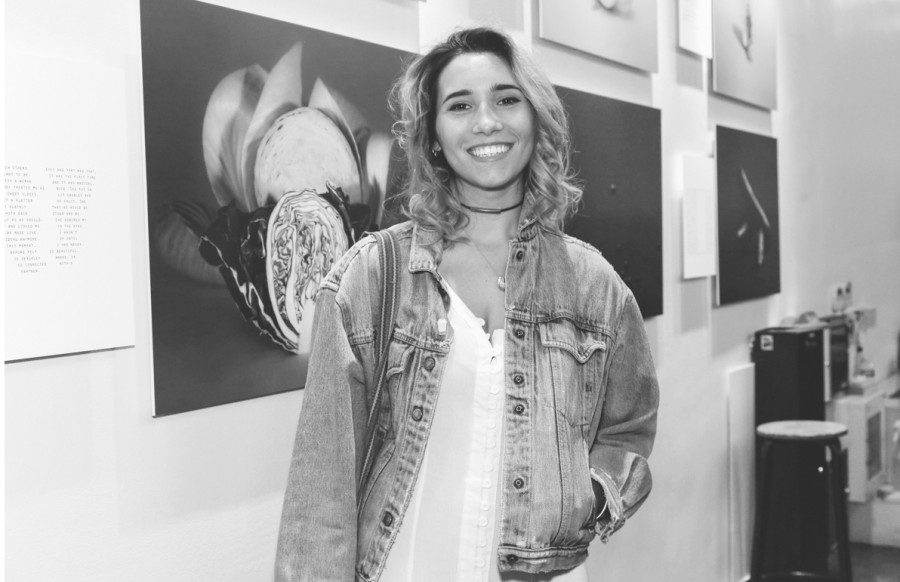Womanhood Buds and Grows in Tisch Exhibit
Ella Barnes is one of the 19 graduating Tisch seniors whose works are being shown in the SHOW TWO 2016 exhibit.
March 28, 2016
If you walked into Tisch this week, you may have noticed the walls looked especially bright and artistic. That’s because the Tisch Photography & Imaging BFA Thesis Exhibition opened on March 24 featuring works in photography, digital imaging, video and multimedia by 19 graduating seniors, including Ella Barnes.
“She,” Barnes’ vivid display of fruit and vegetables intricately organized to convey the experience of womanhood, immediately catches the eye of those who walk in. Coinciding with these photographs are written pieces telling the stories of specific women from Barnes’ life.
“When I’m feeling weak, I find that I recall the moments when said amazing women opened up to me about their colloquial moments of triumph, shame, pleasure, sadness, insecurity, vulnerability or pain,” Barnes said.
While she received enthusiasm and support from these women, it was difficult to get them to open up about some of their most vulnerable moments. After all, Barnes wasn’t looking to write about their day-to-day lives; she wanted something deeper.
“The stories I was looking for are normally the ones you only remember when you’re talking with a group of friends,” Barnes said. “You get to that point where you’re all five stories deep and someone tells a particular tale that drags up the half-forgotten memory of your mother buying you your first bra and telling you that wearing it makes you a woman.”
The way Barnes chose to represent these stories of womanhood is through a collection of fruits and vegetables.
“There is a physical connection I read, in that our bodies are temporal and constantly changing, like a budding, growing, ripening and finally rotting fruit,” Barnes said. “Such organic matter, I believe and reason, is a successful stand in for the female form.”
This idea may be best represented by Barnes’ photo of a pile of blueberries with one separated from the rest. To the side of the photo is one woman’s story of coming to terms with her pregnancy and abortion. Her doctor told her the fetus was just the size of a blueberry at this point, and she decided to have an abortion. Next to the photo, the woman describes her experience as “a terrifying yet beautiful lesson of what it means to be a woman with a body that is a temple capable of forgiveness.”
Other works in the collection include a watermelon sliced open with the pink emerging from the casing, and eggplants, zucchini and summer squash balancing on an angle. Her choice of fruits and vegetables goes beyond the metaphorical parallelism. It is also a gesture of respect for women, both those who shared their stories, and well as those viewing the work.
“I find myself worried about how an endless audience of eyes scours and inspects the skin,” Barnes said. “Perhaps and most often ignoring all that exists right below the surface.”
Barnes uses fruits, vegetables and words to tell the stories of womanhood, capturing the experiences of those brave enough to share and translating these descriptions to instill an emotional understanding in the viewer.
A previous version of this article was updated to reflect that the name of Ella Barnes’ exhibit is “She,” not “Her.”
A version of this article appeared in the March 28 print edition. Email Talia Milavetz at [email protected].
























































































































































